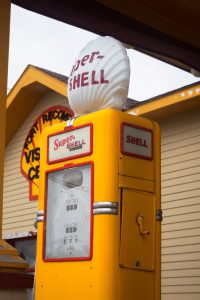How to Get Better Gas Mileage …
and Save Money!
Wait. Let’s start with this, What is gas mileage?
Gas mileage — also known as miles per gallon or MPG — is the number of miles that a vehicle can travel using ONE gallon of gas or fuel. Why do people pay attention to gas mileage? Well, of course, you want to use less gas when you drive so gas mileage – and how to maximize it — is important to know. Using less gas = saving more money.

Photo by Casey Thiebeau on Unsplash
How can I figure out my vehicle’s MPG?
If you have a newer vehicle, a miles per gallon metric was listed on the sales sticker. You can also Google the gas mileage for your make and model. But if YOU want to measure the gas mileage of your car, you can follow these steps from the U.S. Department of Energy’s Office of Energy Efficiency & Renewable Energy:
- Step 1: Fill your tank. Record the current mileage from your odometer.
- Step 2: Run your vehicle to nearly empty, then record your numbers again. Record the new odometer reading and the number of gallons it took to refuel.
- Step 3: Do some quick math. Subtract your first odometer reading from your second to see how many miles you traveled on one tank. Take that figure and divide the number of miles you drove by the number of gallons it took to fill your tank. Your final number is your MPG for that driving period.
What’s considered “good” gas mileage?
The U.S. Environmental Protection Agency has a fuel economy rating that evaluates vehicles on a scale of 1 (worst) to 10 (best). For the 2020 model year, vehicles earning a 1 rating have a MPG of 14 or less, while a vehicle earning a 10 rating has a MPG of 44 or more.
What causes poor gas mileage?
- Speed: The faster you drive – and accelerate — the more fuel your vehicle burns up.
- Idling: (It sort of makes you think twice about warming up the car in winter, eh?).
- Excess weight and certain accessories: Rooftop cargo carriers, bike racks, a full trunk, and towing a trailer are examples of ways that you are weighing your vehicle down. Heavier loads = lower gas mileage.
- Poor maintenance: Failure to consistently “tune up” your vehicle can cost you! Really. Your vehicle needs to be at its optimum capabilities to do its best, most efficient work.
- Quick trips: Short trips eat up fuel because your engine needs to warm up before it can run efficiently.
How can I improve my gas mileage?
- Drive slowly, calmly, at a controlled speed, using cruise control when you can.
- Remove excess weight from your vehicle.
- Keep up with routine maintenance on your car.
- Make trips efficient by running your errands one day a week. And avoid rush hour traffic so you don’t have to idle for long periods of time.
- Consider a more fuel-efficient vehicle the next time you are shopping for one.
We are here to help you in as many ways that we can, whether it is saving money with a better, more efficient vehicle or looking at ways to save on your insurance. Feel free to reach out to us. We always have money-saving ideas!


